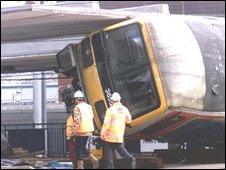Warnings over track before Potters Bar rail crash
- Published

The train was travelling at 98 mph when it derailed
Two passengers tried to raise concerns about the track the night before the train crash at Potters Bar in Hertfordshire, an inquest has heard.
Seven people died and 76 injured when a London-King's Lynn train derailed outside the station on 10 May 2002.
A judge due to hear evidence about the crash said two people made three separate reports about "rough rides".
Checks had been carried out on the approach to the station hours before the crash - but on the wrong line.
One report had been "forgotten", another had been misinterpreted and on the third occasion a train manager had not responded to a passenger's concerns, Judge Michael Findlay Baker QC told jurors at the inquest in Letchworth.
The inquests will examine the deaths of Austen Kark, Emma Knights, Jonael Schickler, Alexander Ogunwusi, Chia Hsin Lin, Chia Chin Wu and Agnes Quinlivan.
The West Anglia Great Northern train careered off the track at 98mph, flipping its rear carriage into the air.
It crashed into a bridge and slid along the platform before coming to rest under the platform canopy. Six passengers in the rear carriage and a passer-by were killed.
Passenger Terrence Moore, a station announcer at Finsbury Park, became concerned about "movement" as a train crossed points on the approach to Potters Bar at around 9pm on 9 May 2002 - about 16 hours before the crash, Judge Baker said.
Mr Moore, who was travelling north from King's Cross to Stevenage, reported his concerns to a member of staff at the ticket office when he arrived at Stevenage.
But the judge said the member of staff had been "busy" and did not log the report. "He forgot," said the judge. "In short, he did nothing."
Mr Moore then reported his concerns to a manager in the King's Cross signal box, but he had thought Mr Moore was talking about the southbound line, not the northbound, said the judge.
Safety checks had been carried out on the southbound line and nothing untoward was noticed, jurors were told.
The jury also heard that Peter Prime, who travelled north through Potters Bar at around 8.30pm on 9 May had also experienced a "rough ride" on the approach to the station.
He had been "sufficiently alarmed" to speak to a buffet car steward, said the judge. The steward promised to pass the report to the train manager but Mr Prime had no response.
Other passengers had come forward after the crash to report rough rides on the approach to Potters Bar prior to the derailment, said the judge, but no train drivers had.
A jury of eight women and three men heard Judge Baker give a detailed outline of facts on the inquest's opening day.
He told the hearing he intended to complete a "comprehensive, rigorous and fair investigation" during the inquest - expected to last three to four months.
"I hope we will do justice to the memory of those who died and provide closure to their loved ones and provide a proper account to the public and to those who were injured," he said.
The judge told the jury there were a number of questions about the points they needed to consider; what state were they in at the time of the derailment; how they came to be in that state; whether their condition was observed; and if not, why not.
The judge also explained why the inquest had taken so long to go ahead. A series of reports into the accident, failed legal proceedings demanding a public inquiry and the 2007 Grayrigg train crash and its associated reports had all contributed to the eight-year delay, he said.
Various demands for a full public inquiry were rejected by the government in 2005.
- Published1 June 2010